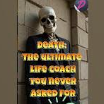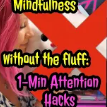What if, instead of asking “Why is this happening to me?” with frustration, you asked it with genuine curiosity?
In this episode of Your Sanity Library, we explore how curiosity can transform the way you experience hard days, emotional triggers, and internal struggles. This isn't lofty, spiritual advice or another self-help overhaul—just real, grounded tools to help you reconnect with yourself, one small shift at a time.
✨ What you'll get in this episode:
– A new way to approach tough moments
– Why curiosity always beats judgment
– The surprising power of subtle mindset shifts
– (And yes, maybe a fun fact about octopuses too)
Your Sanity Library is for people who feel overwhelmed, disconnected, or tired of the pressure to "fix themselves." I believe you're not broken—you just forgot how powerful your inner clarity already is.
Tune in weekly for short, under-10-minute episodes to support your mental well-being with grounded mindfulness and self-awareness practices.
If you’re able to, the full experience—complete with daily visual 1-minute challenges—is available on YouTube, Instagram, and TikTok. All links here: linktr.ee/jaskajost
The Guessing game sum-up (no cheating, only read after having listened!!):
✨ A walking miracle.
✨ Did you know that the odds of you existing are estimated to be 1 in 400 trillion? You are one of the rarest beings in the universe, and here’s why:
You are made of stardust. Every atom of carbon, oxygen, and iron in your body was forged in ancient stars before becoming part of you. (Carl Sagan, Cosmos)
Your body is stronger than steel. Ounce for ounce, human bone is five times stronger than steel of the same density. (Bill Bryson, The Body: A Guide for Occupants)
❤️ Your heart never stops working. It beats 100,000 times a day, pumping 2,000 gallons of blood through your veins. That’s about 730,000 beats per year—and over a lifetime, more than 2.5 billion beats without a break. (Bryson, The Body)
Your DNA is mind-blowing. If unraveled, the DNA in all your cells would stretch to Pluto and back—multiple times! (Bryson, The Body)
You are never alone. Your body is home to trillions of microbes, tiny organisms that outnumber your human cells and help you digest food, fight disease, and even regulate your mood. (Bryson, The Body)
And despite all odds… YOU exist. Let that sink in. You are the rarest, most magical being on this planet. And that’s not opinion. That’s science.
Inspired by The Body: A Guide for Occupants by Bill Bryson & Cosmos by Carl Sagan.
Want more reminders of how incredible you are? That’s what Your Sanity Library is all about. Follow for more. #YourSanityLibrary

Who’s Always Been There for You? This week in Your Sanity Library, we reflect on your relationship with your body—the one companion that’s been...

You're Going to Die. Now What? We hustle, we plan, we wait for “someday.” But death? Death doesn’t wait. It shows up—always on time....

Mindfulness with Your Feet on the Ground Welcome to Your Sanity Library—a grounded, no-nonsense space for self-discovery and mental well-being. I believe you already...